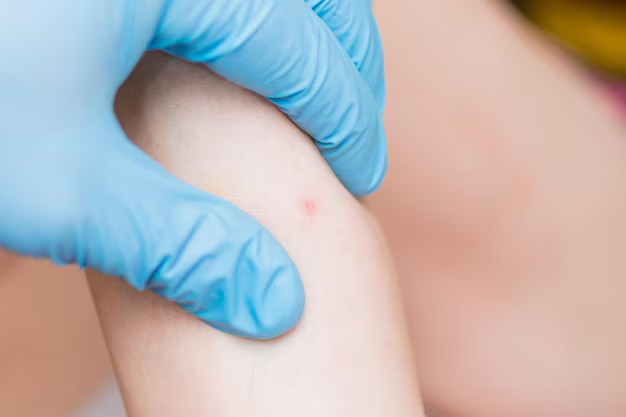Is Eczema Just Another Fungus? Here’s What You Need to Know
Eczema is a common skin condition affecting millions worldwide. If you've ever experienced its itchy, inflamed patches, you know how uncomfortable and persistent they can be. But in understanding eczema, a common question often arises: Is eczema a fungus? This article will delve into this question by exploring what eczema is and examining its causes. We’ll also discuss related conditions, supporting readers in gaining a complete understanding of this skin condition.
Understanding Eczema
To answer whether eczema is a fungus, we need to start with a comprehensive understanding of what eczema is. Eczema, also known as atopic dermatitis, is a chronic skin condition that causes dry, itchy, and inflamed skin. It's prevalent in children but can affect individuals of all ages. Its causes, symptoms, and treatment options vary, but identifying it as a fungus is not one of them.
What Causes Eczema?
Eczema is not caused by a single factor but rather a combination of genetic and environmental factors. Some key contributors include:
- Genetic Predisposition: Individuals with a family history of eczema, asthma, or other allergic conditions are more likely to develop eczema.
- Immune System Involvement: An overactive immune response can lead to inflammation and irritation in the skin.
- Environmental Triggers: Common triggers include pollen, dust mites, pet dander, dry air, and stress.
- Skin Barrier Dysfunction: A defective skin barrier allows moisture to escape and irritants to penetrate the skin more easily.
Symptoms of Eczema
The symptoms can vary, but they generally include:
- Intense itching
- Red, inflamed skin
- Dry or scaly patches
- Oozing or crusty sores during flare-ups
These symptoms differ from those caused by fungal infections, as fungi often result in well-defined, scaly plaques or round spots that tend to be itchy too but appear differently under close examination.
Eczema vs. Fungal Infections
One of the most significant distinctions is that eczema is not a fungal infection. Fungal infections are caused by fungi—microorganisms that include yeasts and molds. Let's compare the two:
Key Characteristics of Fungal Infections
Fungal infections, such as ringworm or athlete’s foot, have distinct characteristics:
- Appearance: They often present as ring-shaped patches with cleared centers and are sharply defined.
- Location: These can occur anywhere on the body, but specific fungal infections may favor certain areas, like the toenails or groin.
- Causes: They are caused by direct contact with fungal spores or growth in moist, warm environments.
- Treatment: Typically treated with antifungal medications.
How Eczema Differs
Unlike fungal infections, eczema:
- Is a Chronic Condition: Eczema can persist for long periods, often fluctuating in intensity.
- Is Not Contagious: Eczema cannot be spread from person to person.
- Requires Different Treatment: Management focuses on moisturizing, reducing inflammation, and avoiding triggers rather than targeting a pathogen like a fungus.
Understanding these distinctions is crucial for effective management and treatment of the underlying condition.
Other Skin Conditions Often Mistaken for Eczema
There are several skin conditions with similar appearances or overlapping symptoms, leading to confusion. These conditions are sometimes mistaken for eczema, but each has unique characteristics:
Psoriasis
Psoriasis, like eczema, is an inflammatory skin condition but is known for its thick, silvery scales and red patches. It results from an accelerated skin production process that leads to the buildup of cells. Unlike eczema, psoriasis is largely driven by an autoimmune process and can similarly flare up due to stress and other triggers.
Contact Dermatitis
Contact dermatitis is another common condition that can mimic eczema. It is caused by a skin reaction to an allergen or irritant, leading to localized redness, itching, and rash. Unlike eczema, however, contact dermatitis is often easily linked to a specific exposure and can be resolved by avoiding the irritant.
Tips for Managing Eczema
Successfully managing eczema involves identifying and minimizing exposure to triggers while maintaining proper skin care. Here are some essential tips:
- Keep Skin Moisturized: Applying thick creams or ointments can help retain moisture.
- Avoid Harsh Soaps: Use mild, fragrance-free soap and detergents.
- Identify and Avoid Triggers: Common triggers include certain foods, stress, or harsh weather conditions.
- Regularly Trim Nails: This helps reduce skin damage from scratching.
- Wear Comfortable Clothing: Opt for natural fibers like cotton to avoid irritating the skin.
Adapting these practices into daily routines can help reduce eczema flare-ups and improve quality of life.
When to Seek Professional Help
Although many people manage eczema with lifestyle modifications and over-the-counter products, it’s essential to know when to seek professional evaluation:
- Persistent Symptoms: If symptoms don’t improve with standard care practices.
- Severe Discomfort: When itching or pain disrupts daily life.
- Skin Infection Signs: These may include increased redness, warmth, swelling, or pus.
Dermatologists can provide personalized management plans and treatments like topical steroids, antihistamines, or light therapy for more severe cases.
Closing Thoughts
Understanding the differences between eczema and fungal infections is crucial for effective management. Eczema is not caused by fungi, and while it shares some symptoms with fungal infections, the underlying causes and treatments differ significantly. Recognizing these differences helps in creating effective management strategies and improving patient outcomes.
Quick Summary: Understanding Eczema 📝
- What is Eczema? A chronic skin condition, not caused by fungi.
- Key Causes: Genetic factors, immune responses, environmental triggers.
- Eczema vs. Fungal Infections: Different causes, appearances, and treatments.
- Management Tips: Moisturize regularly, avoid triggers, use gentle soaps.
- When to Seek Help: Persistent, severe, or infective symptoms.
Remember, understanding your skin condition is the first step toward effective management and improved well-being! 🌿

